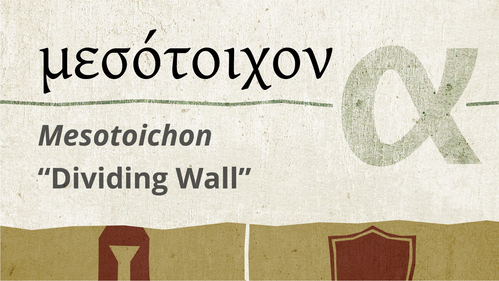Ephesians 2:11-18
Therefore remember that formerly you, the Gentiles in the flesh, who are called “Uncircumcision” by the so-called “Circumcision,” which is performed in the flesh by human hands— 12 remember that you were at that time separate from Christ, excluded from the commonwealth of Israel, and strangers to the covenants of promise, having no hope and without God in the world. 13 But now in Christ Jesus you who formerly were far off have been brought near by the blood of Christ. 14 For He Himself is our peace, who made both groups into one and broke down the barrier of the dividing wall, 15 by abolishing in His flesh the enmity, which is the Law of commandments contained in ordinances, so that in Himself He might make the two into one new man, thus establishing peace, 16 and might reconcile them both in one body to God through the cross, by it having put to death the enmity. 17 And He came and preached peace to you who were far away, and peace to those who were near; 18 for through Him we both have our access in one Spirit to the Father.—Ephesians 2:11-18
There is little peace in the news today. We are bombarded with breaking alerts about escalated fighting in the Middle East, Ukraine, and the uttermost parts of the world. Here at home, we are divided by many things – politics, religion, race, and the economy, to name a few. None of this was God’s intention. Though human conflict is as old as humanity, peace is even older. We learn today that Jesus Himself is our peace.
There is little peace in the news today. We are bombarded with breaking alerts about escalated fighting in the Middle East, Ukraine, and the uttermost parts of the world. Here at home, we are divided by many things – politics, religion, race, and the economy, to name a few. None of this was God’s intention. Though human conflict is as old as humanity, peace is even older. We learn today that Jesus Himself is our peace.
Discussion Questions
- Have you ever felt like an outsider? When was that, and what made you feel that way? Did it change you?
- Share two of your most significant observations.
- Share one application you plan to put into practice.
- In verse 13, Paul states that in the past, Gentiles, non-Jews like most of us, lived without hope and without God. What exactly did Jews possess that Gentiles lacked? See Genesis 12:1-3; Exodus 19:5-6; Romans 9:3-5
- Could Gentiles have a relationship with God during Old Testament times? If so, what did God require of them? See 1 Kings 8:41-43; Isaiah 56:6-7; Jonah 3:1-5, 10.
Dig Deeper: Dividing Wall

This term, used in Ephesians 2:14, is a hapax legomen ((A Greek phrase meaning “something said once”; refers to words that occur only once in a document) in the New Testament. Because of its rare use, mesotoichon in Ephesians 2:14 is translated by several English expressions: “dividing wall” (NASB, ESV).“barrier wall” (NIV), and “middle wall” (KJV).
In Ephesians 2, Paul chooses mesotoichon to describe the fundamental separation between Jews and Gentiles before Christ. As we learned in our lesson today, Paul’s use of the term mesotoichon draws on the imagery of the Jerusalem temple, where walls prevented Gentiles and women from entering areas reserved for male Jews. The term may also refer to the curtain in the holy of holies, though this is less likely. Other interpretations include the law itself and human “flesh,” but Ephesians 2 primarily emphasizes the wall’s destruction, which made possible the unification of Jews and Gentiles into one people.
In Ephesians 2, Paul chooses mesotoichon to describe the fundamental separation between Jews and Gentiles before Christ. As we learned in our lesson today, Paul’s use of the term mesotoichon draws on the imagery of the Jerusalem temple, where walls prevented Gentiles and women from entering areas reserved for male Jews. The term may also refer to the curtain in the holy of holies, though this is less likely. Other interpretations include the law itself and human “flesh,” but Ephesians 2 primarily emphasizes the wall’s destruction, which made possible the unification of Jews and Gentiles into one people.
- What does it mean to be “one new man” in Christ? (Ephesians 2:15)
- How did Jesus break down “the dividing wall of hostility” between Jews and Gentiles? (Ephesians 2:14)
- What are some practical ways that we can live out our unity in Christ, even across different cultures, denominations, and ethnicities?
- How does the knowledge that we are “one new man” in Christ change how we view ourselves and others?
- What are some specific examples of “dividing walls of hostility” that we see in our world today? How can we be a bridge of reconciliation in these situations?
- What does it mean to be “far away” from God? (Ephesians 2:13) How has Jesus brought us near?
- What are some ways that we can share the peace of Christ with others who are far away from God?
- What is one thing that you can do this week to put into practice the truth of Ephesians 2:14?
Posted in Sermon Notes
